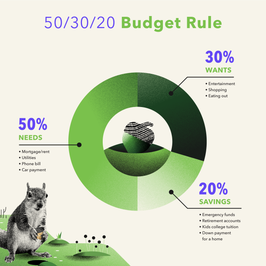How to Budget Money on a Low Income

A budget, when it comes down to it, is nothing more than a financial game plan designed to take the stress out of managing your money. There are several ways to go about it, but the basic idea is the same. After accounting for all your bills each month, whatever's left over should go toward financial goals and fun money.
Simple enough, right?
In real life, though, following a budget isn't always easy—especially if it feels like there's never enough money to go around. If you're in this boat, you're not alone. Only 19 percent of U.S workers say they're comfortable with their income, according to a 2018 Indeed salary report.
Still, if money is tight, creating a budget can be even more important to help you stay on top of your money and make sure your expenses are covered. Here's how to do it on a low income.
Look for trends if your income varies.
An estimated 56.7 million Americans depend on freelance income, according to the Upwork “Freelancing in America” report. And 27 million American workers plan on ditching traditional jobs and taking up self-employment within the next two years, according to a 2018 FreshBooks report. Being an independent worker comes with a lot of perks, but it may take time for your income to catch up and become consistent.
Budgeting with fluctuating income can also be challenging, but it’s definitely doable. You can start by either taking the average amount you earned per month over a 6- or 12-month period, if your income didn’t vary too much, or by taking the lowest monthly amount you earned if you want to be conservative. (If you’re budgeting using the lowest income you earned and you end up making more, that additional money can go toward goals or fun.) It’s also helpful to look back at your earnings from the previous year and see if you can spot any trends. For example, does work tend to slow down around the holidays? Is there a time of year that you always find yourself flush with work? Every industry is different, but identifying these kinds of trends can help you adjust your monthly budget accordingly and prepare for particularly lean months.
Pick up a side gig.
Most side hustlers rake in close to $700 per month, according to a 2018 Bankrate survey. Picking up a side gig can up your earning power and make a huge difference when budgeting on a low income. Before that cash hits your checking account, take a look at your financial priorities:
Essential bills
These are expenses you can't get around paying (think: housing, food, transportation and so on).
Saving and investing
A portion of every paycheck should go toward your savings and investing goals, which includes building up your emergency fund and kicking in some money for retirement and mid-term goals. A healthy savings account is the safety net that will catch you during your next financial hiccup, whether it's job loss or an unexpected car repair. Without an emergency fund, you may end up relying on high-interest credit card debt to see you through.
Discretionary spending
These are expenses that make life a little more enjoyable. Entertainment, travel, shopping and eating out all fall under this umbrella.
If your income isn't quite where you'd like it to be, you may feel like you're constantly falling short in one or two areas. Side gigs can help pick up the slack so you can live more comfortably. If you’re strapped for time, and picking up more work isn’t really an option, consider passive income options like renting out a room on Airbnb. If you don't mind some upfront effort, you can also generate extra cash selling unused or unwanted stuff online.
Cut out unnecessary spending.
It sounds like a no-brainer, but cutting out unnecessary expenses here and there can add up fast. The average American enjoys lunch from a restaurant about twice a week—and spends more than $11 each time, according to a 2015 Visa survey. That works out to $88 per month. Similarly, negotiating everything from your cable bill to your gym membership to your credit card interest rates could help free up hundreds for an otherwise tight budget.
Tracking your spending can also help reveal not-so-great habits (i.e. money-saving opportunities). A quick dive into your last few bank statements may be all it takes for sticker shock to set in. Put it this way: how much we think we spend on happy hour each pay period may not match up with reality.
One other note about expenses: there are some helpful rules of thumb about how much to spend within certain categories. The 50/20/30 budgeting rule, for example, earmarks half of your take-home pay for fixed expenses, 20 percent for financial goals, and 30 percent for flexible spending. If you're overspending in any one area, you can either increase your income or scale back in another category and redirect the savings.
Sometimes making a big (but still reasonable) sacrifice can help break the paycheck-to-paycheck cycle. Is it possible to, say, downgrade your car or temporarily take on a roommate to put you on firmer financial ground? Your future self may thank you for it.
Speak up at work.
You don't have to wait until your annual review to negotiate better pay. If you research competitive salaries for similar roles in your industry and find your income falls short, determine a number that feels right to you and approach your boss. Be ready to prove your worth by showcasing whatever value you've been bringing to the company.
If you've already received a recent pay increase and a raise is off the table, look into any money-saving employee benefits you've yet to take advantage of. Employer-sponsored flexible spending accounts (FSAs), for instance, let you use pre-tax dollars to pay for qualifying medical, dental and vision expenses. Other FSAs can be used for eligible child care costs. (It all depends on the employer.)
Spending boat loads on a high-deductible health insurance plan? Ask your HR department if your company offers a Health Savings Account (HSA). This tax-friendly savings plan can help ease the financial burden of high deductibles.
The takeaway here is that a pay increase isn't the only way to cushion your budget when your income isn't as high as you'd like. Creating a solid spending plan is the best first step for firming up your finances. Once you're rolling, it's all about keeping up the momentum.
This material has been presented for informational and educational purposes only. The views expressed in the articles above are generalized and may not be appropriate for all investors. The information contained in this article should not be construed as, and may not be used in connection with, an offer to sell, or a solicitation of an offer to buy or hold, an interest in any security or investment product. There is no guarantee that past performance will recur or result in a positive outcome. Carefully consider your financial situation, including investment objective, time horizon, risk tolerance, and fees prior to making any investment decisions. No level of diversification or asset allocation can ensure profits or guarantee against losses. Article contributors are not affiliated with Acorns Advisers, LLC. and do not provide investment advice to Acorns’ clients. Acorns is not engaged in rendering tax, legal or accounting advice. Please consult a qualified professional for this type of service.








